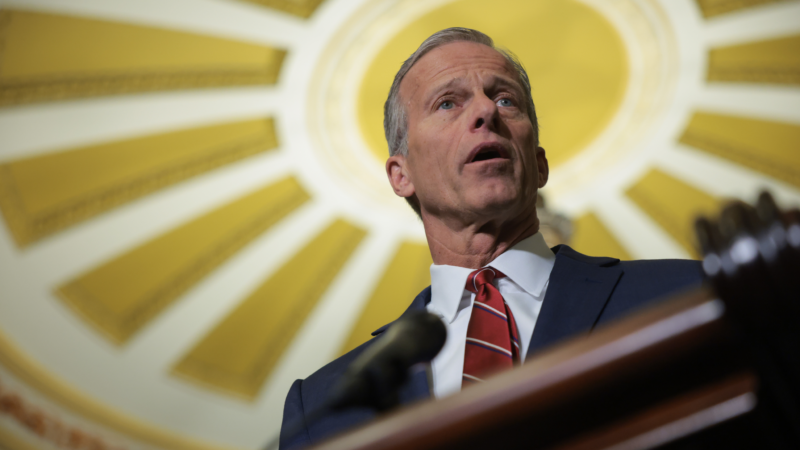Senate Republicans move forward with their budget plan to promote Trump’s agenda
Senate Republicans have unveiled their proposed policy and budget package, setting up a fight with members of their own party and their House counterparts in a race to implement a key piece of President Trump’s legislative agenda.
Sen. Lindsey Graham, R-S.C., chairman of the Senate Budget Committee, released the 70-page Senate budget resolution text on Wednesday. Senators expect to start voting on the sweeping legislation by this weekend.
It would raise the country’s debt limit by $5 trillion to avoid a catastrophic financial default this summer, and make tax cuts that passed under Trump’s first term permanent. The House-passed $4.5 trillion Trump tax plan is included in the package.
“Today is one of the most important steps toward ensuring the Republican majority fulfills its promise to the American people that we will secure our border, strengthen our national security, make President Trump’s tax cuts permanent, and reduce spending,” Graham said in a statement.
If approved, the multitrillion-dollar plan could become a hallmark of Trump’s second term, reimagining the U.S. budget through defense, energy, immigration, and tax policy.
Senate Majority Leader John Thune, R-S.D., said the legislation would pave the way for “generational investment” in border security, national defense and the energy sector.
“Republicans in the Senate and the House are committed to working with President Trump to stop Democrats from imposing an automatic $4 trillion tax hike on the American people at the end of this year,” Thune said of the extension of the Trump tax cuts.
Thune said the plan also aims to reduce the size and scope of the federal government.
Earlier this year, Senate Republicans, impatient with delays tied to intraparty divisions in the lower chamber, jumped ahead of their GOP House counterparts in crafting the package. That’s left House Republicans, with a much tighter margin for their majority, worried the Senate version may lose support.
Senate Republicans crafted a resolution with some flexibility on spending cuts, but that could still face problems in the House, where a group of conservatives want to push for a higher figure.
Earlier this week South Carolina Republican Rep. Ralph Norman, asked about supporting a Senate resolution with a range of spending cuts, told reporters, “To me it’s dead on arrival.”
On the amount of cuts, he said, “It’s gotta be the $2 trillion — we have to be on lockstep with that.” Norman also said he opposed the $5 trillion increase in the debt ceiling, telling reporters, “I had trouble with 4 [trillion]. I went along with that [for the House budget reconciliation plan in February].”
To avoid a filibuster in the Senate and pass new policy, Republicans are using a feature of the budget process called reconciliation. The provisions that they include must have a substantial impact on the budget in order to be eligible for the simple majority vote.
However, even if they pass this resolution, there will be several procedural hurdles between now and when they could potentially pass any new policies.
Regardless, Thune on Wednesday said he was hopeful Republicans would be able to move ahead.
“The Senate parliamentarian has reviewed the Budget Committee’s substitute amendment and deemed it appropriate for consideration under the Budget Act,” Thune said. “It is now time for the Senate to move forward with this budget resolution in order to further advance our shared Republican agenda in Congress.”
Senate Minority Leader Chuck Schumer, like other Democrats, slammed the proposal, claiming it will trigger major cuts.
“As Americans start to feel the pain from the brazen Republican cuts, Republicans are running full speed ahead to pass their plan to gut vital programs, throw Americans off Medicaid, to give massive tax breaks to billionaires,” he said in a statement.
NPR congressional correspondent Deirdre Walsh contributed to this report.
Washington National Opera leaves Kennedy Center, joining slew of artist exits
The WNO is just the latest to say they will no longer perform at the Kennedy Center since Trump took over last year.
Ukrainian drones set fire to Russian oil depot after Moscow launches new hypersonic missile
The strike comes a day after Russia bombarded Ukraine with hundreds of drones and dozens of missiles, including a powerful new hypersonic missile that hit western Ukraine.
Opinion: Remembering Renee Good
Renee Good won a national prize six years ago for her poem "On Learning to Dissect Fetal Pigs," which muses on science and faith. Good was shot to death by an ICE agent this week in Minneapolis.
PHOTOS: Laundry is a chore but there’s a beauty and serenity in the way it hangs out
A new photo series from Filipino photographer Macy Castañeda Lee offers a visually striking view of the mundane task of doing laundry and the role it plays in a rural economy.
2026 looks ominous for media, from Hollywood to journalism
Critic at large Eric Deggans says that in 2026, audiences have more power than they realize to determine the future of news and entertainment.
Influencer, White House welfare fraud claims are distorted, but the system has risks
Federal officials are targeting Democratic-led states over alleged safety-net fraud. Critics worry a drumbeat of unfounded accusations could undermine public trust.







